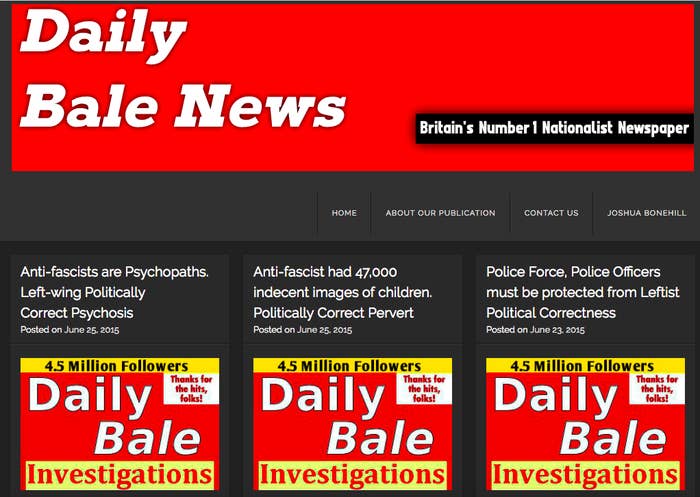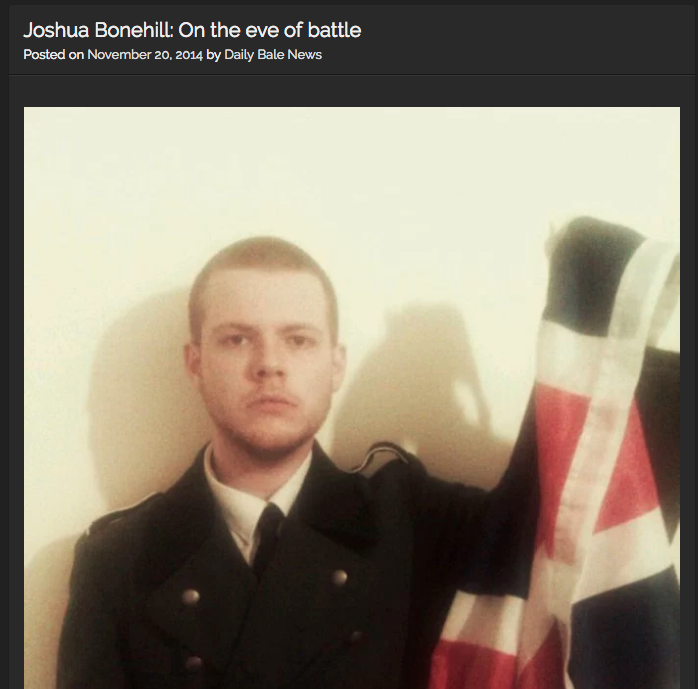
British police forces have resorted to unsuccessfully asking a US-based online content platform to remove offensive and threatening content posted by British far-right trolls, because of the difficulties of policing online content hosted on foreign-owned websites.
According to correspondence seen by BuzzFeed News, in the last year three separate police forces, including the Metropolitan police and Northumbria, either asked WordPress.com to take to take down offensive posts or advised victims to ask the site themselves.
After a complainant contacted the Met about a blogger in the north of England who allegedly had posted pictures of her family online, one Met officer replied in March this year: "We will make a request for the WordPress site to be taken down. Regrettably we cannot force this."
The email continued: "Concerning the removal of websites, i.e. Wordpress and others, this issue was raised with Northumbria [police], however as many of the sites are overseas, this will involve lengthy court proceedings which may take years. In light of this Northumbria have agreed not to pursue this. It was agreed that this may involve a national strategy."
The blog was suspected to have been created by a convicted troll who has been jailed for sending anti-Semitic abuse and threats to public figures.
WordPress.com is owned by Silicon Valley startup Automattic, which maintains that it operates under US law and is beyond the jurisdiction of UK courts. BuzzFeed News has seen multiple complaints sent to WordPress.com about online abuse carried out against British citizens – but in each case, the company said it would only respond to legal requests from US courts.
In April the same victim had contacted WordPress.com to ask it to take the offensive posts down. They were told that the company would only respond to a legal request served by a US court or enforcement agency.
The boilerplate emailed response said that in the event of such action the author of the blog would receive a copy of any legal papers and be given a chance to challenge the disclosure of their personal information through the legal process.
WordPress.com also said it would charge an "administrative fee of USD $125/hour for compliance with validly issued and served civil subpoenas and reserve the right to review and object to any legal process we receive".
Eventually the WordPress blog in question was taken down in October after police intervention. The same victim has been sent pictures of knives and pictures of her family via Twitter messages in the past two years, which she suspects is related to the same pattern of abuse.
In a separate case, a person who complained to the police about allegedly being targeted by a blogger who was the subject of a police investigation for an alleged communications offence.
After being named on the blog, the victim's name then appeared on several far-right websites. She required counselling and treatment for depression for several months.
In February this year police replied to say that there was little they could do and that the victim should contact WordPress. She did this and was told:
"Hi there, we do not remove content from WordPress.com sites unless it is a violation of our Terms of Service or we receive a court order or a valid DMCA [Digital Millennium Copyright Act] request. For more information on how to file a complaint, please see: http://en.wordpress.com/complaints/."
The victim forwarded this to police and added: "Why can't you issue a Harassment Order against them? What do they have to do to me before this is taken seriously? Do I, as a victim of harassment, not have any rights?" She received no reply.
Later, in March, the same victim contacted the police again to ask for an anti-harassment order to be made.
"Please I'm begging you to do something," she said. Again, she received no response.
BuzzFeed News isn't naming the victims of abuse mentioned in this article, to protect their identity, nor is it naming the alleged perpetrators of the abuse, for legal reasons.
Mark Armstrong, a spokesman for Automattic, told BuzzFeed News: "We take reports of inappropriate activity very seriously, and we have teams of people dedicated to investigating any reports of abuse.
"WordPress.com has specific Terms of Service and User Guidelines outlining what is allowed. People can also report sites that they believe are in violation of those user guidelines."
Asked what British-based victims of abuse hosted on WordPress.com should do, he said: "They should report the site to us – we have a process for reporting abusive content available to users worldwide (link) and we review and act on these reports as quickly as we can.
"If a site violates our policies, we’ll immediately remove it. For some issues (like defamation for example) – there’s often a question as to whether the site content is true or not. We aren’t able to decide these cases ourselves and rely on the judgement of a court before taking any action."
The WordPress.com terms of service tell users: "Do not post direct and realistic threats of violence. That is, you cannot post a genuine call for violence—or death—against an individual person, or groups of persons. This doesn’t mean that we’ll remove all hyperbole or offensive language."

Preventing online hate speech has become a serious challenge for police across the UK. This week marks National Hate Crime Awareness Week, which Chief Superintendent Dave Stringer of the Met said was "an opportunity for officers to continue raising awareness of hate crime and encourage victims to come forward."
Earlier this month the home secretary announced a new national hub to tackle online hate crime, set up to "ensure all online cases are properly investigated and will help to increase prosecutions for online hate crimes".
And in 2016, the Met set up a dedicated division with a £1.7 million budget to tackle the problem.
But despite police efforts, serious examples of online abuse remain online: A WordPress site created by one of the UK's most notorious trolls, which was used to write hateful blog posts that landed him with a jail sentence for racially aggravated harassment, is still online.
Joshua Bonehill-Paine, 24, was jailed for two years in December for using the site to write a string of offensive blog posts about Luciana Berger, which are still online. One of them – titled "Is the Labour Party a Jewish Party?" – depicted Berger's head on the body of a rat.
Berger, who declined to comment for this article, told BuzzFeed News after Bonehill-Paine's conviction that she still receives hateful abuse online.

Despite huge investment by police forces to tackle the problem – the Met alone has 900 hate crime investigators across its 32 boroughs – there remain practical and cultural challenges in combatting online abuse.
Another of Bonehill-Paine's victims told BuzzFeed last year that while the officer that responded to his complaint was helpful and attentive, he admitted to not knowing how to send an email, let alone how to investigate crimes carried out on social media platforms by people with multiple pseudonymous accounts.
WordPress is one of several online platforms that have come under fire this year for hosting abusive and extremist material. Home secretary Amber Rudd said in March that the site could do more to combat terrorism, while Theresa May told an international summit in September that sites including WordPress should remove extremist content within two hours of it being posted.
A spokesperson for the National Council of Chief Police Officers said: "We wouldn't be able to give details of the new [national online abuse] hub as it has just been announced and work is ongoing to define the role it will play.
"It will be established as a central point of contact for police forces so that we can enhance the intelligence picture around online hate crime as well as operationally linking in all forces and with internet companies.
"Our first goal is to improve reporting to police as the most recent experimental stats from the Home Office acknowledge that they under-record these offences."
